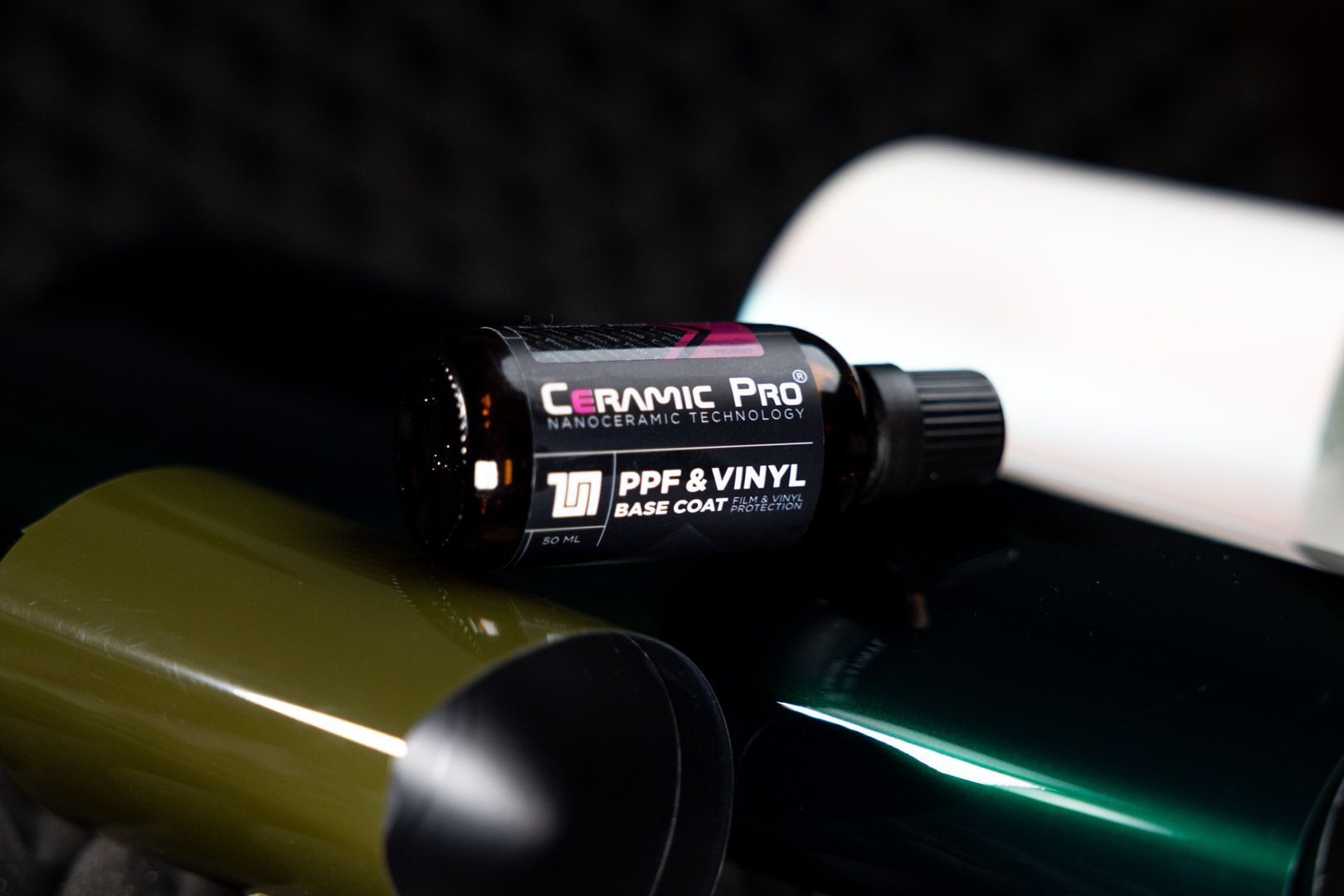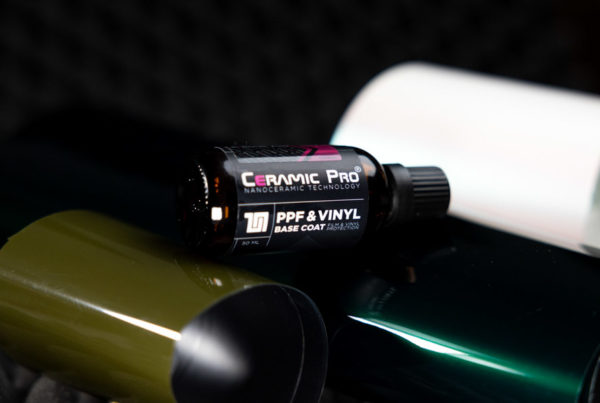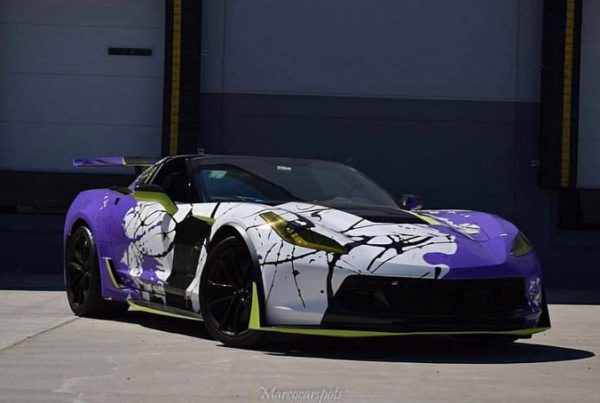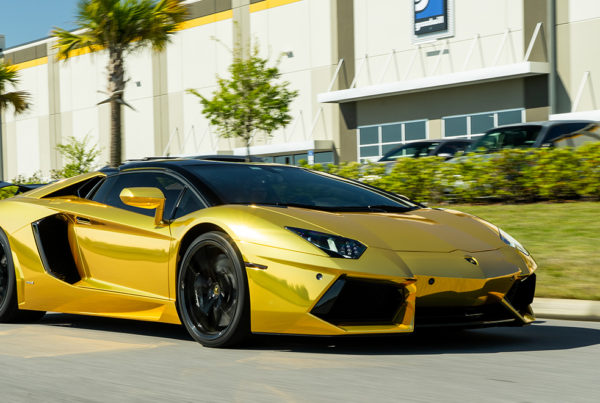How to Protect a Vinyl Wrap
Installing a vinyl wrap is a great way to temporarily customize the look of your ride. Whether you prefer minor graphic enhancements, looking to brand or advertise, or going full chrome wrap, the modern vinyl decals or vehicle graphic gives a car owner flexibility to spice up their rides – at an affordable price. But how do you protect a vinyl wrap from prematurely wearing out?
The vinyl itself is a durable material, that can hold up for three years in most cases. However, UV exposure, acid rain, bird droppings, bug splatters, typical contaminants, and road grime can age the vinyl wrap sooner than you’d think. Plus, excessive exposure to rain or water (even simple car washes) can penetrate the vinyl film top layer, and cause damage to the adhesive.
With all that said, if you’re going to invest the money in a vinyl wrap, it makes sense to protect the wrap, so it’ll last longer – right? Well, that’s what we’ll discuss in the information below. In today’s CeramicPro.com blog, we’ll explore the best practices for keeping your vinyl wrap clean, protected, and enhanced.
What’s the Best Way to Wash a Car Wrap?
Vinyl car wraps are made from Poly Vinyl Chloride or PVC. Manufacturers will add plasticizers which provide added flexibility. This attribute allows the material to bend, flex, and bond to smooth, rounded corners with ease. There are additional additives such as stabilizers and UV absorbers, which helps to protect against UV rays, and common natural elements.
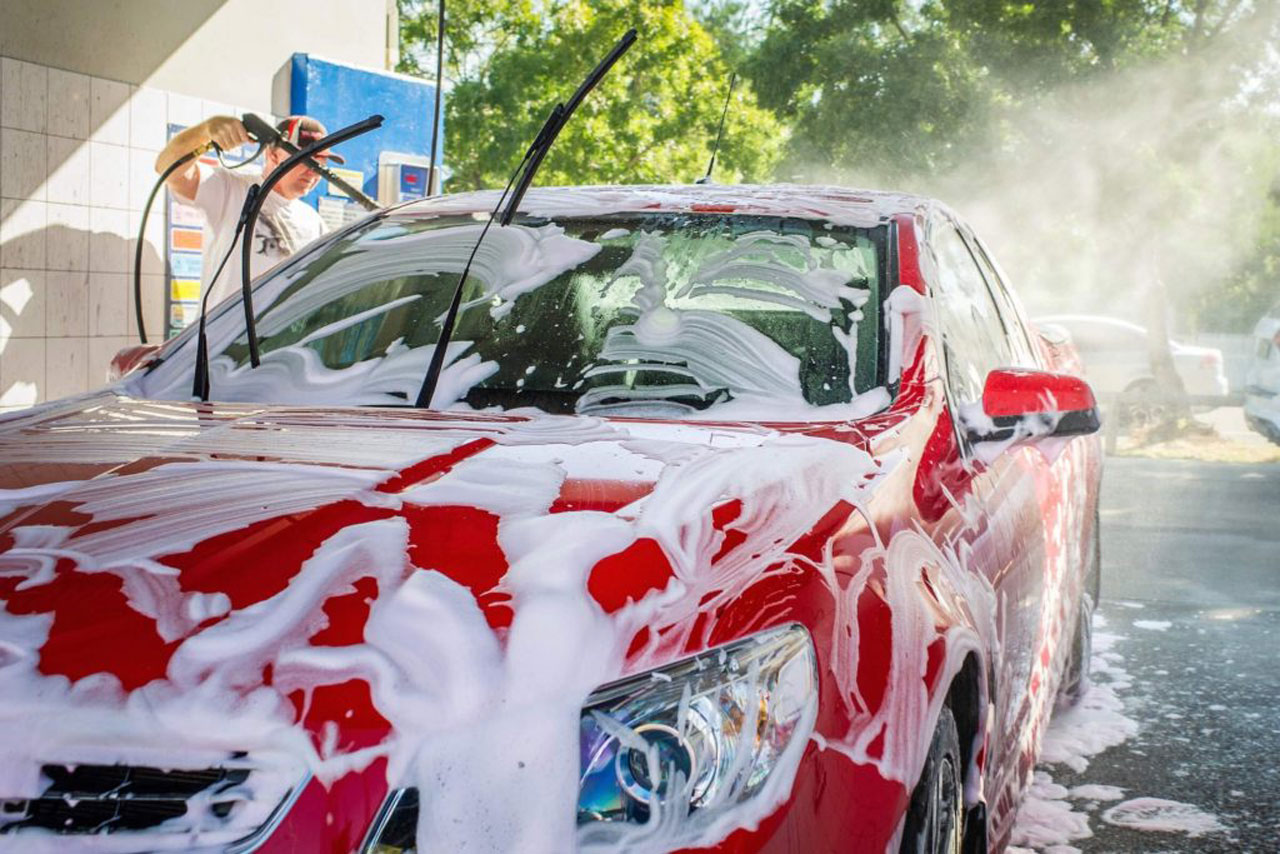
The local drive-thru car wash might be convenient, but it’s not the best way to wash a vinyl wrap. The high pressure sprayers can cause damage to the unprotected car wrap. Plus, the soaps are often pH positive degreasers.
Beyond that – the material is rather basic. Its primary purpose is to provide a decorative layer of protection on top of the vehicle’s paint surface. But it’s not coated with a protective finish, like car wax, paint sealant, or ceramic coatings. This allows water to seep or penetrate the vehicle vinyl wrap occasionally, which can lead to damage to the adhesive glue or stick to the paint job.
Nonetheless, a vinyl car wrap should be maintained via car washes every few weeks. So, what is the recommended type of car wash for a car wrap?
What Car Soap Should I Use to Wash Vinyl Wrapped Car?
Since vinyl wraps are very porous, it’s hard to find a car shampoo for wraps that won’t leave a residue after you’re done washing. Most car soaps contain wax or petroleum distillates – which are added mainly for lubrication or creating massive suds out of a foam cannon. Car soaps from automatic car washes are extremely acidic or on the other end of the pH scale – too alkaline based.
So – is there a car wash soap that is designed specifically for car vinyl wrap? Actually – there is, and it’s been developed by Americana Global – the recommended aftercare detailing supply manufacturer for Ceramic Pro products.
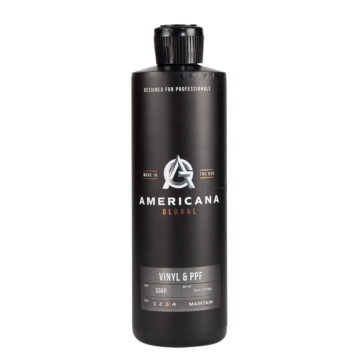
The waxes or petroleum ingredients can accelerate UV damage to a vinyl wrap or PPF. This is why the best car soap for vinyl wraps should contain no wax or any ingredients that will leave any residue. When used as directed, Americana Global Vinyl & PPF soap can help extend the lifespan of your vinyl.
The Two Bucket Method Car Wash
This tried and true hand washing option is the choice of professional detailers and car and truck enthusiasts across the globe. It involves using at least two buckets (although many recommend a separate or third bucket just for washing wheels and tires), one filled with car wash shampoo and water – the other with fresh water and a grit guard.
The theory behind this washing method is to remove any dirt and debris from the wash mitt before putting fresh soapy water on the vehicle. This helps to reduce scratching of the vinyl vehicle wrap surface.
Can You Pressure Wash a Vinyl Wrapped Car?
Many gloss or matte wrap installers are not too hype on pressure-washing-wrapped vehicles. The main reason why is that high-pressure water can tear vinyl material. If you’re going to wash your vinyl-wrapped vehicle with a high-pressure sprayer, it’s always recommended to do so with the lowest pressure nozzle and pressure setting.
One variant of standard high-pressure car washing is to use a foam cannon to apply the car shampoo in ultra-suds producing method. With this washing technique, you’ll let the soap dwell for a few minutes, then proceed to rinse it off with a lower pressure nozzle. For added cleaning, you can blend this technique with the two-bucket method.
What’s the Best Way to Dry a Car Wrap?
A car wrap is not hydrophobic. In fact, it’s notorious for soaking water into the material, which can seep into the adhesive. This issue introduces the importance of drying the vinyl wrap sooner than later. There are two recommended methods for drying a car wrap.
Drying with High-Pressure Air
Serious detailers and car enthusiasts are big believers in non-touch drying methods, such as using a leaf blower to dry their freshly washed vehicles. The problem with this method is that it’s usually done when there is a ceramic coat on top of the substrate or vehicle surface layer. If you don’t have a ceramic coat on top of your wrapped vehicle, you can still use the leaf blower method, followed up with a high-quality microfiber towel.
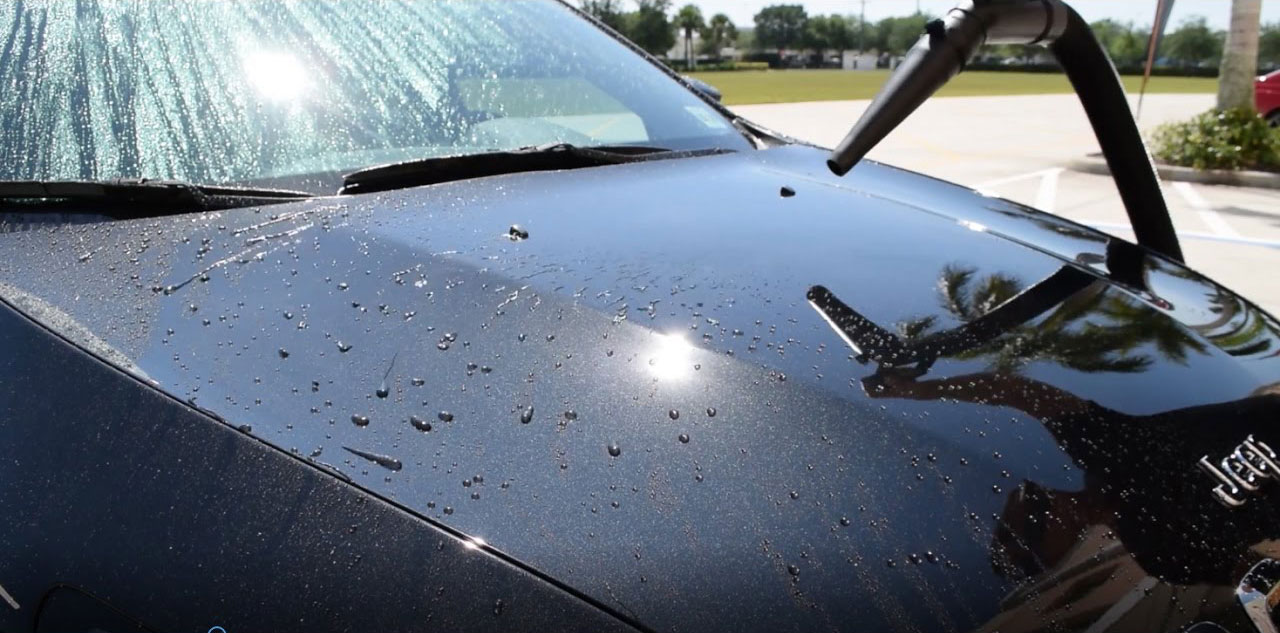
The hardcore car enthusiast and many professional detailers will use a leaf or industrial blower to dry a car. However, if the vinyl wrap is not coated with a hydrophobic surface protectant – this is rather difficult.
Dedicated Microfiber Drying Towel
The preferred method of drying a glossy vinyl wrap or one with a matte finish is using a dedicated drying towel. Most experts suggest using a terry weave, a 70/30 blend of microfiber, with a GSM above 800. These new drying towels can remove all water from your average sedan or SUV within a matter of minutes using a single drying towel.
What Products are Best for Protecting Vinyl Wraps?
Once the vinyl wrapping is clean and free of debris, it’s time to determine how you’re going to protect it from future damage. There are a few paint protection products that you can apply to vinyl, that will provide a sacrificial layer of protection.
Traditional Carnauba Wax
The most popular and easiest for the DIY enthusiast vinyl protectant is applying a traditional car wax. Whether you prefer paste wax or liquid versions, the concept is basically the same. You’ll apply the liquid or paste wax, allow it to ‘flash’ or dry, then buff off with a microfiber cloth or buffing pad.
Once it’s cured, car wax will harden to provide a sacrificial layer of protection that will block UV rays and help improve hydrophobic properties. Car wax will hold up for a few months when applied to vinyl.
Paint Sealants
The upgrade from a regular car wax is a synthetic wax or paint sealant. However, there are many detailers that debate the effectiveness of paint sealants on a vinyl wrap, as they are formulated to bond to a clear coat on original paint – not soft vinyl materials. So, you might want to stay away from straight paint sealants for protecting vinyl.
DIY Spray Ceramic Wax
One product that will bond to vinyl and factory paint is the hybrid ceramic wax in the spray or paste variety. The main difference between this product and regular wax is the infusion of ceramic substances, such as silicon dioxide or Teflon. This helps to provide additional hydrophobic properties, which makes water bead on the surface instead of seeping into the material.
However, these products only include a small percentage of “ceramic” materials and don’t harden very well. As such, they only provide six months of protection.
DIY Nano Ceramic Coatings
If you’re looking for the first level of hardness for longer-lasting protection, the DIY ceramic coat is your first step. This is a concentrated nano-ceramic with reduced carrier solvents for easier application. The product can harden to 9H levels – so it is among the hardest surfaces. The problem with these products is the inconsistency of formulations.
While one DIY nano coating might hold up for up to two years, another similar product may not work at all. Plus, with the reduced carrier solvents in the formulation, you simply can’t add more than a single coat of these products. And, all DIY ceramic coatings are essentially “one-size-fits-all” formulations, meaning they’re not made specifically for vinyl or protective film materials.
Additionally, they’re not as easy to apply as they advertise. If you don’t have a garage, or the patience to apply in certain temperature and humidity ranges, it’s just not practical for most car owners. Ask most experienced vinyl wrap installation companies – and they’ll recommend against the DIY coatings, as there are too many variables that can’t be controlled.
Professional Nano Ceramic Coatings for Vinyl Wraps
The upper tier of vinyl wrap protection is the professional-grade nano-ceramic coatings that are specifically formulated for vinyl and PPF or clear bra. A product like Ceramic Pro PPF and Vinyl is engineered with nanotechnology that allows the coating to penetrate those tiny imperfections on the top layer of the vinyl. This provides an anchor for the coating to bond with the wrap, then harden exceptionally flat on top.
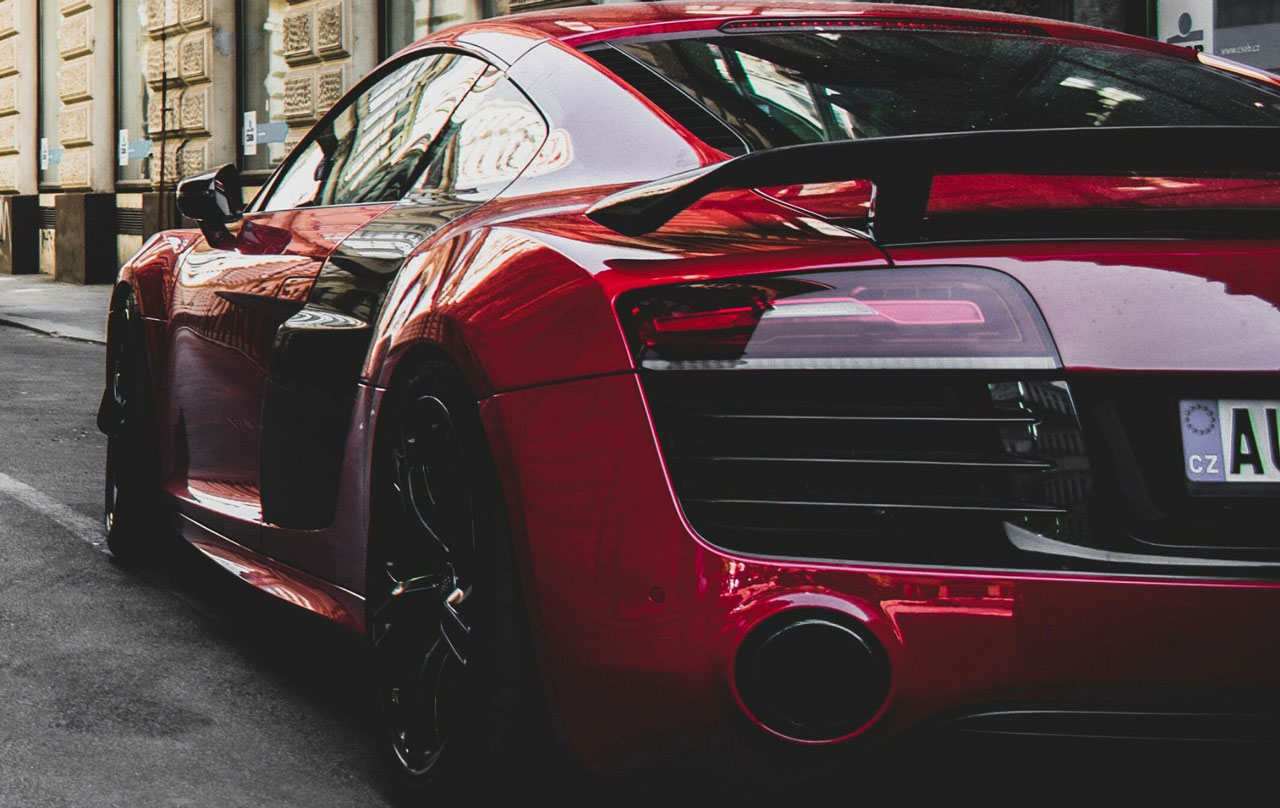
This brilliant chrome red wrap is protected with Ceramic Pro PPF & Vinyl on top of Ceramic Pro Kavaca paint protection film. It offers the ultimate shield of protection.
Once the base coat is applied, you can opt for additional layers, which provide additional protection in the future. This can significantly extend the life expectancy of your vinyl wrap and provide multiple protective benefits including:
Blocks Water from Penetrating to Adhesive
One of the main reasons a vinyl wrap wears prematurely is due to water exposure – specifically when it penetrates the adhesive that’s bonded to the car’s paint. When this happens, it loosens the adhesive, making it more likely that the vinyl will peel apart from the paint. However, it also creates a rather sticky mess underneath.
In fact, when it comes time to remove the vinyl from your car, a major cost to consider is the clean-up due to this problem. By having a professional ceramic coating to your car wrap, you’ll eliminate this issue.
Produces a Super Hydrophobic Surface
The pro-ceramic coating is the most hydrophobic coating on the market today. When it’s installed on top of your car wrap, it reduces the potential of dirt, dust, pollen, tree sap, bird droppings, bug splatters, and road grime from sticking to the surface. This keeps the wrap cleaner for longer periods and makes it easier to wash and dry.
Superior Protection Against UV Exposure
The main contributor to premature aging and fading on vehicle wrapping is UV rays. Ceramic Pro coatings for vinyl and PPF are formulated to provide excellent protection that blocks UV rays.
Paint Protection Film for Vinyl Wraps
One of the quickest growing trends in vinyl protection is the installation of clear PPF on top of the vinyl. PPF is formulated completely differently than vinyl and is intended for protection first. It not only provides protection against UV rays, but also damage due to small rocks, tree branches, and other road debris.
It can be argued that PPF is the best product for protecting a vinyl wrap – simply due to its ability to reduce scratching or damage due to road debris strikes.
What’s the Best Ceramic Coating for a Vinyl Wrap?
If you’re thinking about having a ceramic coating applied on top of your vinyl wrap, it makes sense to invest in a professional-grade solution that is formulated for these materials. Ceramic Pro PPF and Vinyl coating is the best product available for these situations.
If you’re in the market for a new vinyl wrap and would like to keep it looking great, protected, and easier to clean – click the button below to request a free estimate for Ceramic Pro PPF & Vinyl.


